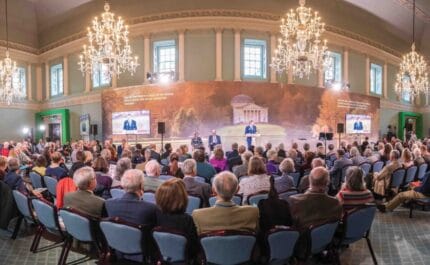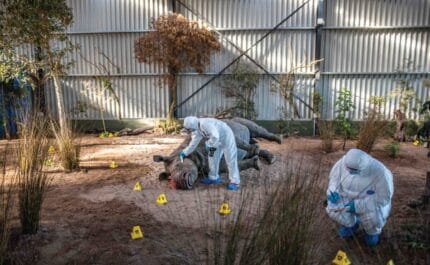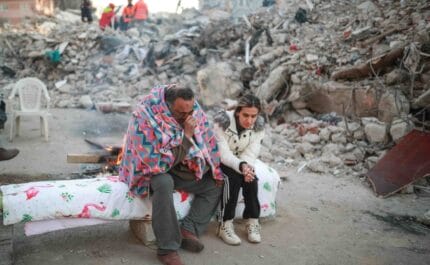Moment that mattered: The Boca Juniors team bus is attacked at the Copa Libertadores final
On 24th November 2018 an attack on the Boca Juniors football team’s bus by fans of Buenos Aires rivals River Plate caused a last-minute postponement of the match to decide South America’s Copa Libertadores tournament. As riot police moved in to contain the violence that soon erupted among fans already in the stadium, filmmaker Eli Mengem found himself caught up in the turmoil
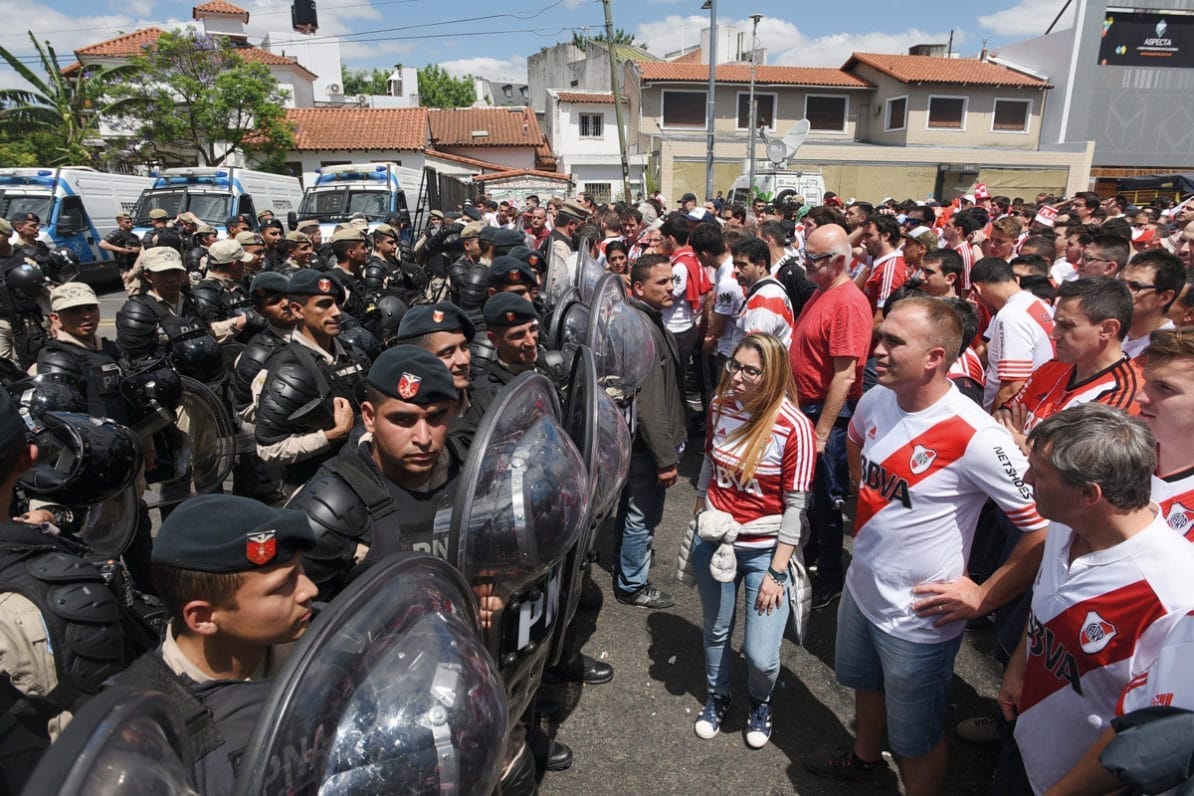
Police confront River Plate fans outside the stadium following the attack on the Boca team bus. Photo: Santiago Viana / AFP / Getty Images
24th November 2018 (Taken from: #33)
“An hour before the scheduled start of the second leg of the Copa Libertadores final on Saturday 24th November, the Boca Juniors team bus was pelted with missiles by fans of fellow finalists River Plate.
“Several of the players, who were on their way to their rivals’ El Monumental stadium in Buenos Aires, were hurt by shattered glass from the broken windows. Others were affected by tear gas, which appeared to have been fired at the missile-throwing fans by police. The violence – and the subsequent decision to move the decisive game in South America’s version of the Champions League to Spain – would seriously damage the reputation of Argentinian football.
“I was in Argentina working on an episode of my documentary series Derby Days, which explores the fiercest rivalries in football. Over the past five years I’ve filmed derbies all over the world, but none of them were anything like this. All derbies in Argentina are passionate, but this one is by far the biggest. Boca Juniors are a working-class side, seen as the team of the people, while River Plate are known by their nickname Los Millonarios (‘the millionaires’).
The match would involve the biggest police operation in the history of Argentina. There were many police officers, but it felt like they were in the wrong place”
“The two teams have played one another nearly 250 times over 105 years, but until now the Buenos Aires rivals had never faced each other in the final of the Copa Libertadores. To add to the sense of occasion, this would be the last time the Copa Libertadores final would be held over two legs, one at each club’s stadium; from next year the final will be a single match at a neutral ground. So there was a real feeling that this would never happen again.
“Matches between River Plate and Boca Juniors are known as ‘Superclásicos’. This was a ‘Superclásico plus’. For both sets of fans, any excitement over winning the final was far outweighed by a fear of losing it and the prospect of mocking humiliated rivals was more exciting than celebrating victory. In 2011 River Plate were relegated to Argentina’s ‘B’ league for the first time in their history, and Boca fans never miss a chance to remind them of it. I have met Boca fans who had tattoos done of the letter ‘B’, so that they will never forget the occasion.
“I had arrived in Argentina three days before the first leg, which was postponed due to torrential rain. The match was to be held in La Boca, an old neighbourhood, and some streets were so flooded that you couldn’t get down them to reach the stadium. It seemed absurd that a game of this magnitude would be called off due to rain.
The fans started marching out of the stadium and it soon turned ugly”
“The rearranged fixture ended in a 2-2 draw on Sunday 11th November, and it was the best atmosphere I’ve ever experienced at a football match. It was the way the fans celebrated the occasion, with everyone from elderly women to young children screaming at the top of their lungs. There were flares, smoke bombs, balloons and choreographed cheering. This was despite the fact that, in an effort to curb violence, no away fans were to be allowed at either game – so only Boca supporters were there.
“The game a week later at River Plate was finely balanced. There’s no away-goals rule [when in the result of a draw over two legs, the team with the most away goals wins], so the first result essentially didn’t matter. I was worried that there was no way Boca could win at River Plate, something I felt more certain about when I entered the imposing El Monumental stadium with its huge crowd. The fans would probably invade the pitch [to get the match cancelled] before they would suffer the humiliation of losing a game of this gravity on their own turf. I’d read that the match would involve the biggest police operation in the history of Argentina. There were many police officers, but it felt like they were in the wrong place. All the police really had to do at River Plate was protect the Boca team on their bus, which, with no away fans, was Boca’s only presence at the game.
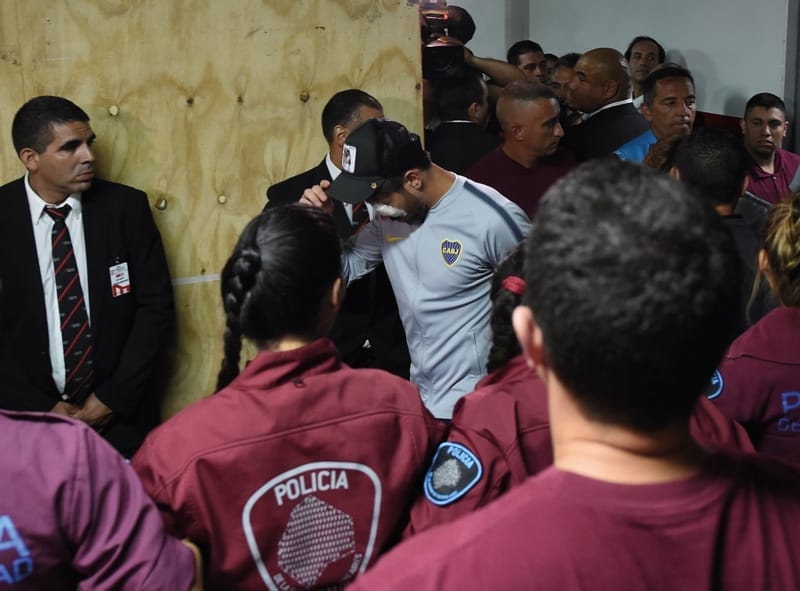
Pablo Pérez of Boca Juniors arrives at Monumental Stadium after receiving treatment for an eye injury caused by an attack on the team’s bus. Photo: Marcelo Endelli / Getty Images
“When I was in the stands I got a text saying that the game had been postponed, and then I heard about the bus attack and the tear gas on a WhatsApp call. We found out before everyone else in the stadium because we had access to press wifi and there was limited phone reception, so the fans kept singing and cheering until I saw this kind of reverse Mexican wave of quietness as the news filtered through. Over the next few hours the police kept telling fans that the game was going to happen that day because they didn’t want any violence – the kick-off was moved from 5pm to 5.30pm, then to 6pm, 7pm and finally 7.15pm, and at one point the referees even came out to warm up. Around 7pm I headed outside to get some fresh air and I saw Claudio Tapia, the president of the Argentinian football association, walk away from the stadium surrounded by security, and enter the car park. Then I saw [FIFA president] Gianni Infantino get into a car and speed off. That’s when I knew the game was not going to be played that day.
“The fans started marching out of the stadium and it soon turned ugly. The game had been postponed to the following day, and because the same plastic ticket would get you in, some fans leaving the stadium were being robbed at knifepoint by people without tickets. The police began firing rubber bullets at people. I was in a fenced-in area for ticket holders right outside the stadium and when the violence started, thousands of fans who had left the stadium began running back into this enclosed area. It was one of the most terrifying moments of my life. I felt like we were being crushed against the wall. People were crying and screaming, and some were trying to pass their kids over the wall to safety.
The team didn’t want to play. They didn’t think it was safe, and they had every right to be scared”
“The teams were meant to play the next day but few people expected that the game would go ahead. The Boca players weren’t mentally or physically ready after the bus attack, and they didn’t want to play. They didn’t think it was safe, and they were right to be scared. Also, some believed that they could win the trophy without playing. There was a precedent for this: in 2015 Boca were disqualified from the Copa Libertadores after their fans attacked River Plate players with pepper spray in a last-16 tie. I was on the way to El Monumental for the rescheduled game when I heard that the match had been cancelled again.
“On 29th November, CONMEBOL, the continent’s governing body of football, announced that the rescheduled second leg would be played in Madrid. It’s ironic because the trophy is named after liberation from Spain. To me it’s offensive, the idea that South America is too uncivilised to hold the game whereas Spain isn’t. It borders on colonialist. Ordinary Argentinians would now have to spend more than two months of an average salary to travel to the match. Around 20,000 tickets were reserved for Real Madrid fans, and many of these were resold to Argentinian fans for five times the normal price. Both teams objected to the switch to Europe.
He said that it no longer mattered who won – he felt terrible that Argentina had embarrassed itself in the eyes of the world”
“My film ends with the taxi driver who was taking us to the airport breaking down in tears. He is a passionate Boca fan, but he said that it no longer mattered who won – he felt terrible that Argentina had embarrassed itself in the eyes of the world. The switch to Madrid still makes me angry. I refused to watch the final [won by River Plate 3-1 after extra-time] and I will never watch it. I had the option of going to Madrid to finish the film there, but I refused. I didn’t want to shoot fans celebrating after all this, so instead the film ends with a black screen.
“As far as I was concerned, this match ended at River Plate’s stadium. The Madrid game was a weird offshoot, not the real thing. If it couldn’t happen in Argentina, it shouldn’t happen anywhere else. In my opinion they shouldn’t have given the trophy to either team. That would have been the perfect ending.”
Eli Mengem’s film Derby Days: The Biggest Game of All Time can be viewed on YouTube and at copa90.com
Slow Journalism in your inbox, plus infographics, offers and more: sign up for the free DG newsletter. Sign me up
Thanks for signing up.
